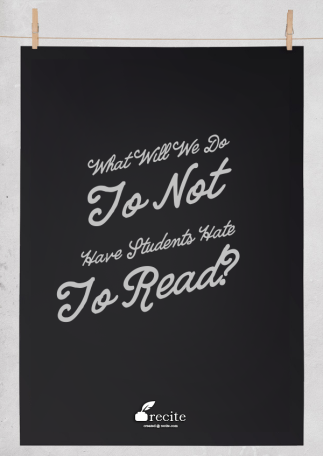At Any Given Moment We Have the Power to Stop the Hatred of Reading
It used to astound me that my 4th graders would come to me and profess a hatred of reading. It used to shock me to the core. After all, these were the same kids that would ask for just one more page of our read aloud. Who would ask me to read a picture book aloud the minute it came to our room. Who had no problem confessing the love for the book we were sharing, but had none for the one they were reading alone. I always thought that the next year’s teacher would surely get them on the right path even if I couldn’t.
Now I am the next year’s teacher, and their dismay of books has only grown further. The group of children telling me that they never read outside of school has only grown. And this is not a boy-reader problem, this is an any gender problem. This is not something just caused by poverty, nor disengaged parents, nor reading difficulties. I see the hatred of reading defended the most from my students who have had every opportunity to fall in love with reading. I know I am not alone in this. And I know I cannot wait for someone else to fix it.
So I started to dig a little deeper. I get that they “hate” reading, but why? What parts was it that caused so much emotion, or sometimes so little, that students would have a physical reaction to whenever we had independent reading time. And their truths were not pretty, because the finger they pointed, pointed right at me. Or us, as educators.
We may think that it is too easy to blame teachers for the systematic destruction of reading love in our schools, and it is, because there are forces beyond our control that have a huge part in this as well. But part of the blame does lie with us, and that means we can do something about it. Especially in the upper grades where reading is no longer treated as something magical, but instead merely something useful.
At any given moment, we have the power to stop ourselves from telling students what to read. In our eagerness to shape well-rounded readers we are instead creating non-readers. In our eagerness to make sure students are exposed to all types of books, we are limiting them from discovering their own reading identity. Would we rather have a child that reads every single fantasy book they can come across, or a child that begrudgingly only reads a few books a year from other genres?
At any given moment, we have the power to make reading fun again. Fun is a not a swear word in our schools. There is nothing wrong with discovering a book that makes us laugh, or makes us wonder, or makes us think. Reading does not always have to have a purpose. It can be just to share a wonderful experience.
At any given moment, we have the power to stop interrupting children while we read. To not point out every single detail. To not have them do post-its for every thought they have. To not have them turn-and-talk every few minutes. Let them reach the reading zone as Nancie Atwell calls it. And not just once in a while but most of the time.
At any given moment, we have the power to reclaim what reading should feel like in our classrooms. To stop always using whole-class novels. To stop furthering our own vision for what makes a reader a reader. To stop hanging our own reading identities around the shoulders of students and wonder why it does not fit?
At any given moment, we have the power to create classrooms where reading is magical. Where reading is celebrated. Where reading is taught, but taught in a way that does not extinguish the love of the very thing we are trying to promote. But we have to look at our own practices first, we have to stand up and change. We have to ask our students what we are doing so that we can be better. So that their love of reading does not have to survive our classrooms. So that their hatred for reading does not have room to grow. But it starts with us, not them.
If you like what you read here, consider reading my book Passionate Learners – How to Engage and Empower Your Students. The 2nd edition and actual book-book (not just e-book!) comes out September 22nd from Routledge.
Filed under: being me, Literacy, Passion, Reading, student voice






